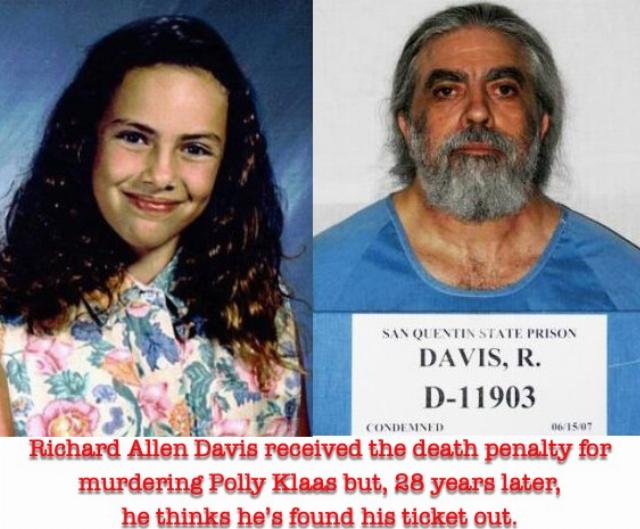Polly Klaas’s killer: In California, justice delayed is justice denied
Almost 31 years ago, Richard Allen Davis, a career criminal, murdered 12-year-old Polly Klaas in a crime that, in a more innocent time, had the ability to shock the nation. It was so shocking that, even in California, Davis got the death penalty. Now, though, after 28 years of hanging out on death row, Davis thinks that California’s crazy leftist laws are the lifeline he needs.
In 1993, Petaluma, California, was a peaceful, very low-crime, rural community 35 miles north of San Francisco. On October 1, Polly was playing hostess to two friends for a slumber party. In the middle of the night, Davis broke into the house, tied up Polly’s friends, and abducted Polly. Later that night, he strangled her to death.
Looking back at 1993, it feels like a very different time. Polly’s kidnapping and the discovery that she’d been murdered truly shocked the nation. There were no racial or class politics swirling about it. It simply horrified people to know that, even in the most peaceful communities, monsters existed and that they killed children.
And it turned out that Davis really was a monster. Thanks to the increasingly lax criminal justice laws California had introduced beginning in the 1960s, Davis was a long-time repeat offender. Beginning when he was a teenager, he was repeatedly arrested for theft, burglary, being AWOL in the military, public drunkenness, illegal drug use, kidnapping and attempted sexual assault, regular assault, and assault with a deadly weapon.

Image by Andrea Widburg.
As Davis got older, it became a pattern for him to kidnap and sexually assault women. In 1984, he violently attacked his then-girlfriend’s sister and forced her to withdraw money from the bank. He received a 16-year prison sentence for that crime, only to be paroled a mere 8 years later.
Three months after his very early parole, Davis kidnapped and murdered Polly. Police caught up with him two months later, at which time they learned that, after he’d driven his car into a ditch, the police had helped him with the car, even as a terrified Polly was still alive but to afraid to call out.
Typically for child abduction cases, Davis murdered Polly within hours of kidnapping her. However, it would be two months before Polly’s body was found. During those months, the nation was riveted on the search for Polly, hoping for the best but fearing the worst. Her funeral was a nationally televised event. I still tear up when I hear the song “Somewhere Out There.”
In the early 1990s, although California’s criminal justice laws were getting increasingly lenient and the state was obviously failing to keep monsters off the street, California was still a conservative enough state that it had elected two Republican governors in a row: George Deukmejian, who was governor from 1983 to 1991, and Pete Wilson, who was governor from 1991 to 1999. In that long ago and far away California, it was still possible for Davis to get the death penalty, a verdict handed down in 1996. That judgment was made possible not just because Davis murdered someone but also because of his long, long criminal record.
Most people, myself included, assumed that Davis was duly executed sometime after 1996. We probably assumed it took a while, as the various appeals worked their way through the system, but surely he was dead by now. Except Davis isn’t dead. He’s been living at taxpayer expense in San Quentin, roughly 30 miles from where he killed Polly, for the last 28 years.
Now, Davis sees a chance to seize the life he denied Polly:
Davis’ lawyers argue that a recent criminal justice reform law that invalidated certain sentencing enhancements entitles Davis to have his sentence reconsidered. Sonoma County prosecutors and Polly’s father, Marc Klaas, who became a crime victim advocate after her murder, disagree.
“We had every expectation that the sentence of death recommended by the jury and imposed by Judge Thomas Hastings would keep him segregated from society for the rest of his life,” Klaas said in a statement. “We could not have been more wrong!”
Did you catch that Marc Klaas never believed that Davis would actually die for his crimes? He just hoped that it would prevent parole and Davis’s return to the streets.
Davis’s theory is that the death penalty he received was a “sentencing enhancement” because of his prior convictions. A 2021 bill eliminating sentencing enhancements applied retroactively specifically to get more criminals out of prison and onto the streets. California, of course, would never build more prisons. Better to make law-abiding citizens prisoners in their own homes—unarmed, of course—in a world knee-deep in violent, sociopathic people.
California was once the Golden State, leading the way in American modernity. However, California’s abandonment of core justice (“Anyone who becomes merciful upon the cruel one will end by being cruel to the merciful”) has turned it into a parody of good governance. There are elections, there is a working legislature, and the state has a Supreme Leader…er, governor, but it’s actually an anarchic, despotic place in which evil walks and the innocent tremble.
Read More: Polly Klaas’s killer: In California, justice delayed is justice denied

